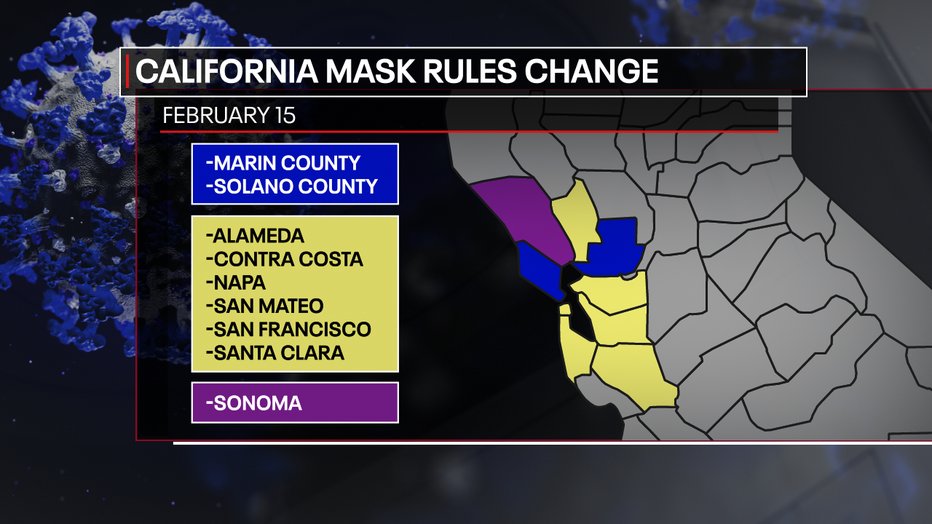Who's lifting the indoor Bay Area mask mandate? A county by county breakdown

Who's lifting the indoor Bay Area mask mandate?
California will end its indoor mask requirement for some people in a week, meaning that people who are vaccinated will no longer be required by the state to wear a mask indoors. But that's not a sure bet that you can whip off your KN95 on Feb. 15. In fact, that all depends on the county, or even the city, that you live in.
OAKLAND, Calif. - California will end its indoor mask requirement for some people in a week, meaning that people who are vaccinated will no longer be required by the state to wear a mask indoors.
But that's not a sure bet that you can whip off your KN95 on Feb. 15.
In fact, that all depends on the county, or even the city, that you live in.
County health departments are allowed to set guidelines that are stricter than what the state requires. And it appears that several Bay Area counties are leaning in that direction.
Marin and Solano counties confirmed to KTVU that they will align with state masking guidelines and not require vaccinated people to wear masks in most indoor settings.
Several other Bay Area counties including Alameda, Contra Costa, San Francisco, Santa Clara, Napa and San Mateo health officers said they haven't decided yet but plan to make an announcement about local masking rules sometime before next week.
Sonoma County has not yet responded.
"The omicron curve is coming down so fast, it takes time for communities to react," said UCSF infectious disease expert Dr. Peter Chin Hong. "What you're seeing is various communities responding to the same science and same numbers, depending on what their level or risk is."
But even among each county, there still could be a patchwork of varying mask guidelines.
Even though Solano County will relax mask guidelines next week, the cities of Benicia and Vallejo have their own citywide masking mandates and could choose to keep them in place.
COVID sick pay: California Assembly votes to bring back paid sick leave through Sept. 2022

California will lift its indoor mask requirement for people who are fully vaccinated against COVID. But counties may set individual rules that follow the state guideline or are more strict. The blue counties, Marin and Solano, have said they will ali (KTVU FOX 2)
Dr. Jeanne Noble, UCSF assistant professor of emergency medicine, said lifting the statewide mask mandate represents a shift in how we live with coronavirus in the months and years to come.
"Large surges are likely behind us, after we're done with this Omicron surge, but COVID isn't going to go away. We need to get back to 2019 living," she said.
California’s public health director, Dr. Tomas Aragon cited declining Covid case rates, stable hospitalization numbers, better pharmaceutical treatments and vaccines on the horizon for children under age five, as reasons for the relaxed mask rules. Covid cases in California plummeted 65 percent compared to their peak a month ago.
Once the state masking rules are relaxed, there will still be exceptions. Masks will still be required on public transit, in congregate living facilities, at work and K-12 schools.
On Monday, the Democratic governors of several states, from New Jersey to Oregon, announced that masking would become optional in school settings in the coming weeks.
When it comes to ending masking mandates in California schools, the health department said the "state is continuing to work with education, public health and community leaders to update masking requirements at schools to adapt to changing conditions" and that "additional adjustments" to the state policy "will be shared in the coming week."
"It's a little bit of a political decision," Noble said. "We now are three months out from the approval of vaccinations for all school-age kids. So, from just a health and safety point of view, masks should be coming off our kids."
It's not clear at this point whether counties and individual school districts will be able to keep masking rules in place even if the state decides to relax those rules.

